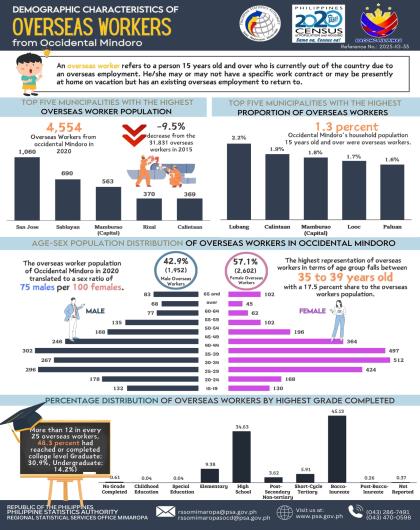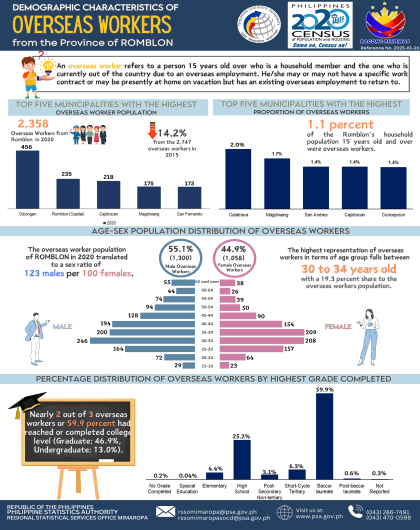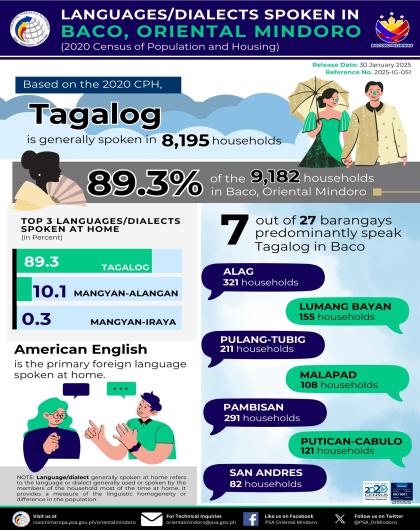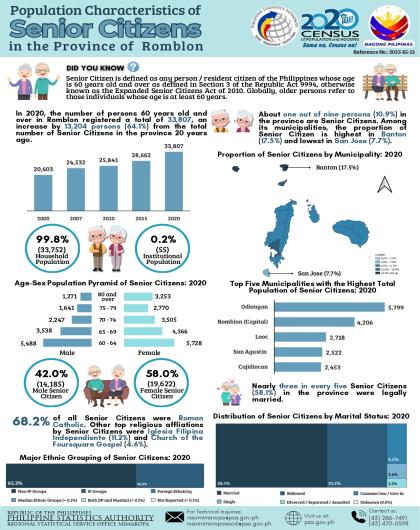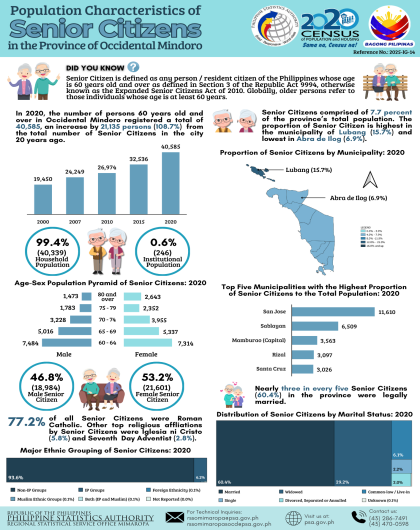SPECIAL RELEASE
Housing Characteristics of Victoria, Oriental Mindoro
(2020 Census of Population and Housing)
12,140 occupied housing units in Victoria, Oriental Mindoro in 2020
Based on the 2020 Census of Population and Housing (2020 CPH), the municipality of Victoria, Oriental Mindoro listed a total of 12,140 occupied housing units. In 2015, there were 11,120 occupied housing units recorded while in 2010, there were 10,395 occupied housing units.
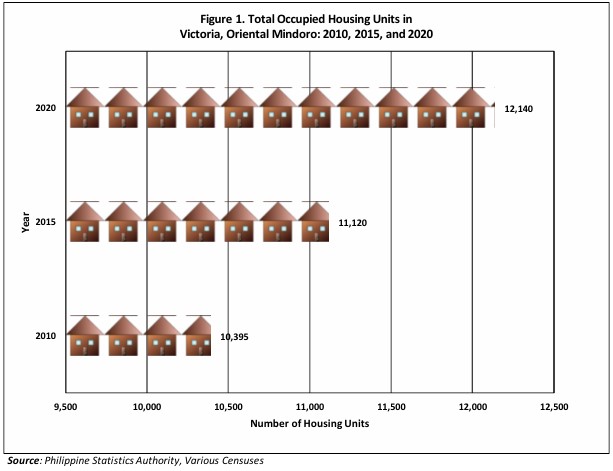
Between 2020 and 2015, the number of occupied housing units increased by 1,020 or 9.2 percent.
In 1960, the reported total number of occupied housing units in Victoria, Oriental Mindoro was 2,095, that is, 17.3 percent of the number of occupied housing units of the municipality in the 2020 CPH.

Victoria ranks seventh with the highest number of occupied housing units in 2020 in Oriental Mindoro
The municipality of Victoria recorded 12,140 occupied housing units in Oriental Mindoro in 2020. This represents 5.7 percent of the total number of occupied housing units in the province.
The City of Calapan and the municipalities of Naujan and Pinamalayan are the top three areas of the province in terms of the number of occupied housing units. The City of Calapan had the highest number of occupied housing units with a total of 34,644 occupied housing units or 16.3 percent share of the occupied housing units in the province. This was followed by the municipality of Naujan with 26,317 or 12.4 percent share and Pinamalayan with 20,926 or 9.8 percent share.
The municipality of San Teodoro had the least number of occupied housing units with a total of 4,500 occupied housing units or 2.1 percent share of the occupied housing units in the province.
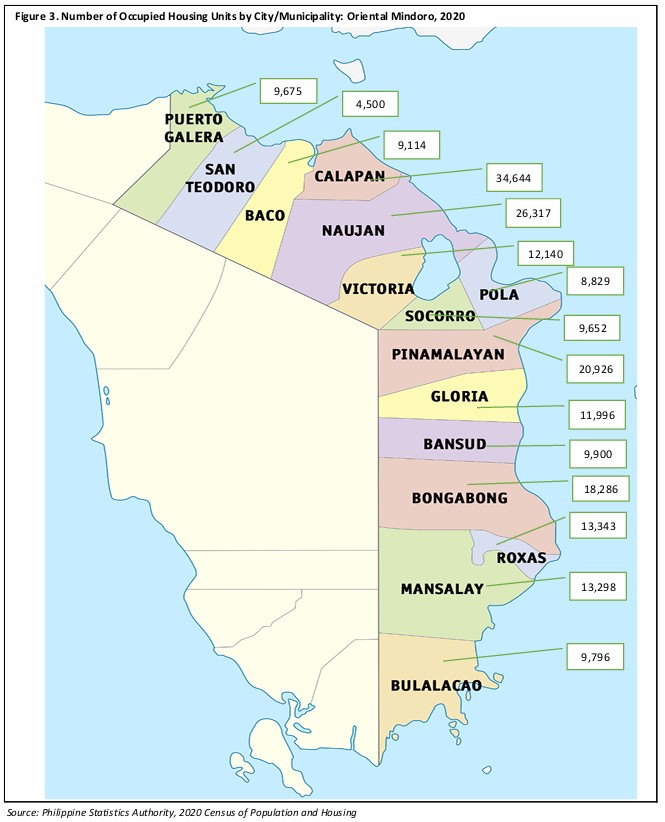
A ratio of approximately 101 households per 100 housing units in Victoria in 2020
A total of 12,250 households was recorded in Victoria, Oriental Mindoro in 2020. This translates to approximately 101 households per one hundred occupied housing units. In 2015, the same ratio was recorded for the municipality.
Across the province, the municipality of Puerto Galera recorded the highest ratio of 103 households for every 100 occupied housing units. This was followed by Socorro and four other municipalities with a ratio of 102 households per 100 occupied housing units. The other four municipalities are Bongabong, Pinamalayan, Pola, and Roxas.
Across the province, the municipality of Puerto Galera recorded the highest ratio of 103 households for every 100 occupied housing units. This was followed by Socorro and four other municipalities with a ratio of 102 households per 100 occupied housing units. The other four municipalities are Bongabong, Pinamalayan, Pola, and Roxas.
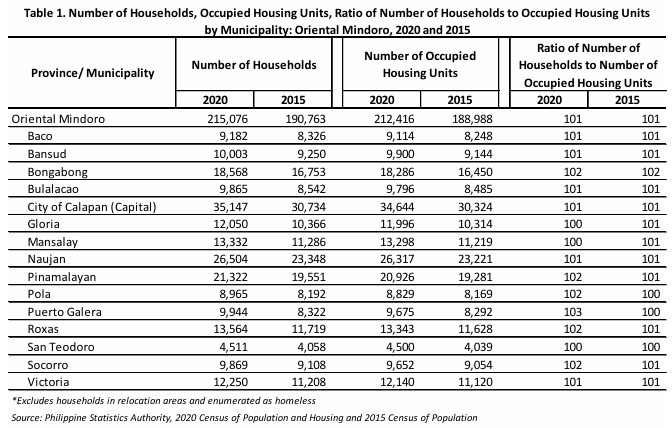
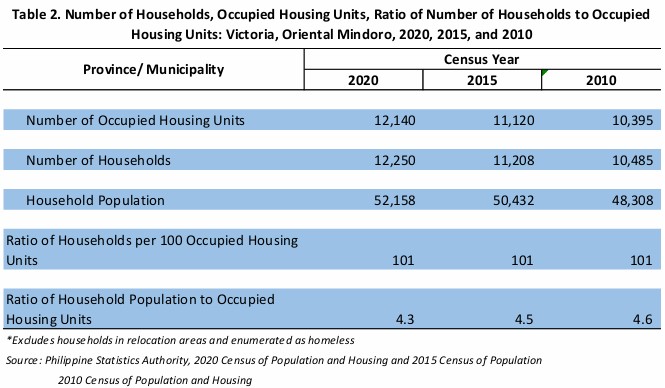
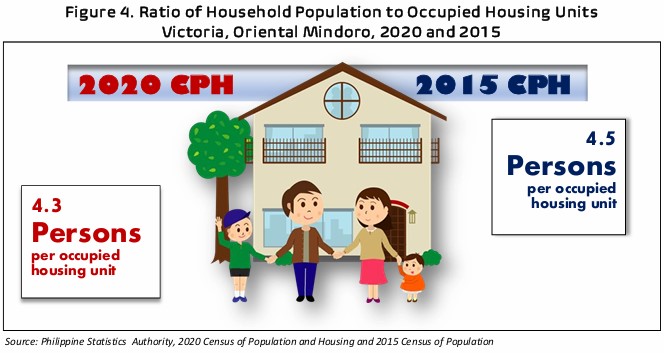
Majority of the occupied housing units in Victoria are single houses
Of the total number of occupied housing units in Victoria, Oriental Mindoro in 2020, a total of 11,422 or 94.1 percent were single houses. This was followed by occupied housing units in duplex with 368 (3.0%), apartment/accessoria/ rowhouse with 257 (2.1%), commercial/industrial/agricultural with 58 (0.5%), and other multi-unit residential with 35 (0.3%).
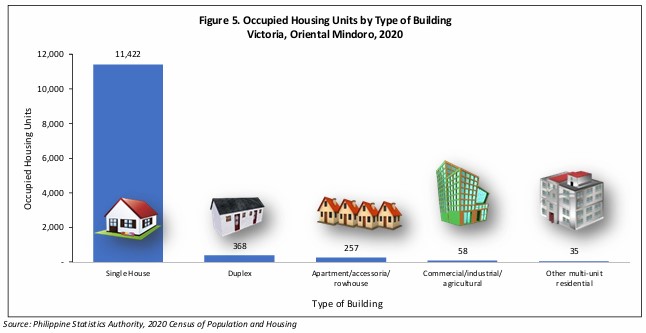
Occupied housing units in Victoria have strong materials of the outer walls and roofs
In 2020, three of the five occupied housing units in Victoria had outer walls made of concrete/brick/stone (63.2%) followed by outer walls of occupied housing units made of half concrete/brick/stone and half wood with 13.0 percent. On the other hand, 12.2 percent of the occupied housing units had outer walls made of wood while 9.5 percent had outer walls made of bamboo/sawali/cogon/nipa.
Likewise, 89.0 percent of the occupied housing units in 2020 had roofs made of galvanized iron/aluminum. The proportion of occupied housing units with roofs made of cogon/nipa/anahaw comprised 7.2 percent and concrete/clay tile comprising 1.9 percent. Housing units made of half galvanized iron and half concrete comprised 1.0 percent, wood/bamboo with 0.6 percent, and makeshift/salvaged/improvised materials with 0.1 percent.
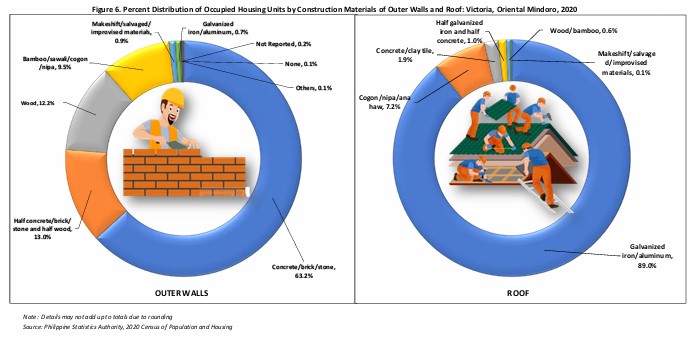
Majority of the occupied housing units in Victoria have concrete construction materials of the floor
Four out of five occupied housing units (85.7%) have concrete construction materials of the floor. Other construction materials of the floor in occupied housing units in Victoria are earth/sand/mud (8.5%), wood (2.8%), bamboo (2.7%), and not reported (0.2%).
On the other hand, almost half or 45.5 percent of the occupied housing units have cement/brick/stone as finishing materials of the floor. About 22.9 percent had ceramic tile/marble/granite for finishing materials of the floor. Linoleum finishing materials accounted for 16.6 percent. Approximately 11.1 percent of the housing units had no finishing materials for the floor. Wood plank comprised 3.0 percent, others comprised 0.4 percent, vinyl carpet tire had 0.3 percent, and wood tile/parquet with 0.1 percent. Moreover, about 0.2 percent of the occupied housing units did not report the finishing materials of the floor of their housing unit.
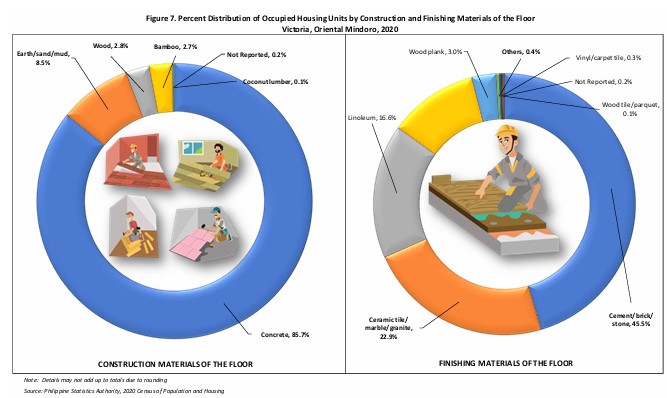
Most of the occupied housing units in Victoria are one-storey buildings
Majority or 93.9 percent of the occupied housing units in the municipality of Victoria were one-storey buildings while occupied housing units in two-storey and three-storey buildings were recorded at 6.0 percent and 0.1 percent, respectively.
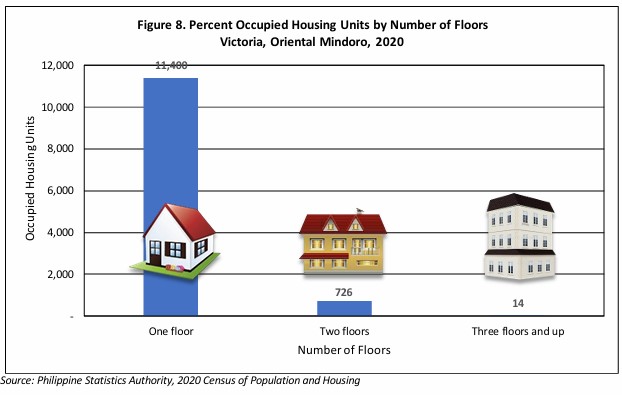
Majority of the occupied housing units in Victoria needs minor repair or no repair at all
Eight in ten occupied housing units (83.1%) only needed minor repair or need not be repaired at all. Meanwhile, the proportion of occupied housing units needing major repair comprised 13.4 percent.
Moreover, the other occupied housing units were categorized as unfinished construction (1.5%), under construction (on-going) (1.2%), under renovation/being repaired (0.5%), and dilapidated/condemned (0.3%).
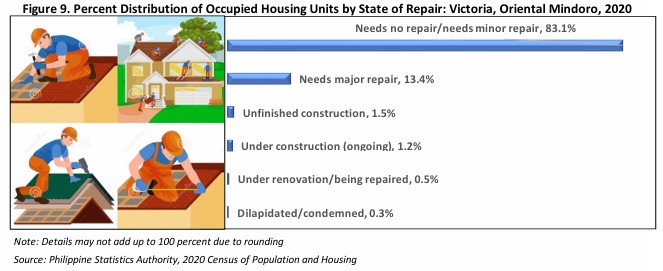
Two in five occupied housing units in Victoria were built within the decade prior to the 2020 CPH
Two in five (43.2%) of the occupied housing units in Victoria were built 10 years prior to the 2020 CPH, that is, in the period 2011 to 2020, while 21.1 percent were built during the period 2001 to 2010. On the other hand, 17.2 percent were built during the period 1991 to 2000. Furthermore, 8.0 percent were built during the period 1981 to 1990, and 7.0 percent were built during the period 1980 or earlier.
Meanwhile, 3.5 percent of the occupied housing units in the municipality are of unknown construction years (Don’t Know).
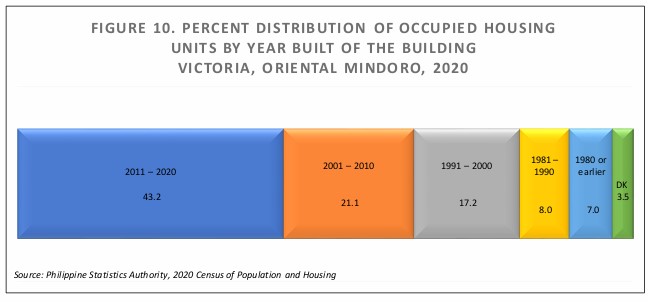
Majority of the occupied housing units in Victoria have floor areas less than 20 square meters
In 2020, occupied housing units in Victoria, Oriental Mindoro with floor areas of less than 20 sq. m. (less than 209 sq. ft.) accounted for 26.2 percent of occupied housing units. This was followed by occupied housing units with floor areas of about housing units with floor areas of 30 to 49 sq. m. (210-317 sq. ft.) comprising 23.7 percent and 20 to 29 sq. m. (210-317 sq. ft.) comprising 23.2 percent.
Meanwhile, occupied housing units with floor areas of 50 to 69 sq. m. (533-748 sq. ft.) accounted for 11.7 percent. Those with floor areas ranging from 70 to 89 sq. m. (749-963 sq. ft.) accounted for 6.5 percent while those with floor areas from 90 to 119 sq. m. (964-1286 sq. ft.) accounted for 4.6 percent and those of about 120 sq. m. (1287 sq. ft.) or more accounted for 4.0 percent.
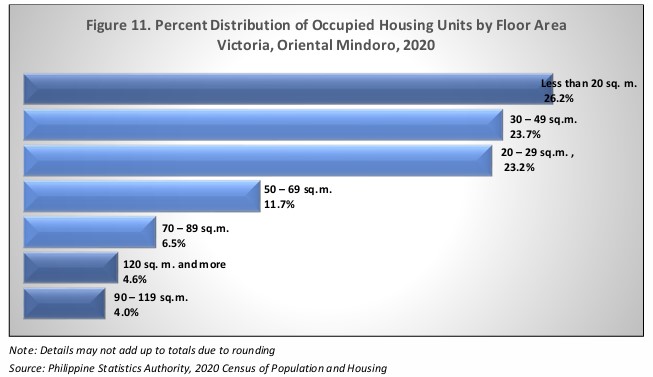
More than half of the occupied housing units in Victoria are owned or has owner-like possession of the house and lot
Of the 12,140 occupied housing units in Victoria in 2020, 57.0 percent were owned or had owner-like possession of the house and lot. Moreover, 25.9 percent of the housing units were own house rent-free lot with consent of the owner. Furthermore, 9.5 percent of the housing units were rent-free house and lot with consent of owner, and 4.7 percent of the housing units were rent house/room including lot. In addition, 2.1 percent were own house rent lot and 0.7 percent were own house, rent-free lot without consent of owner.
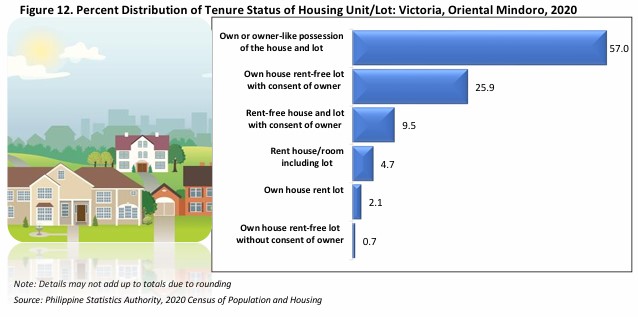
The statistics presented in this Special Release were based on the information provided by the household respondents or any responsible member who provided answers to the questions and gave information about the characteristics of the housing units. For the following data items, observation of the building/housing unit by the enumerator was allowed during the data collection of the 2020 CPH:
1. Type of Building;
2. Number of Floors of the Building;
3. Construction Materials of the Roof;
4. Construction Materials of the Outer Walls; and
5. State of Repair of the Building.
(SGD) DONNA MARIE D. MOBE
(Supervising Statistical Specialist)
Officer-in-Charge
Oriental Mindoro Provincial Statistical Office


